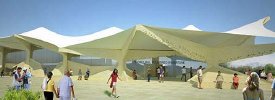Apr 13 2010
As part of the effort to strengthen research cooperation with China in the field of climate and energy technology, the Research Council of Norway will be holding a seminar on renewable energy and carbon capture and storage at the World Exhibition EXPO 2010 in Shanghai on 21 – 22 May.
“The seminar will provide a unique opportunity to profile Norwegian research in one of the world’s fastest growing research nations and to establish contacts with specialist expertise in China. We are confident that this could evolve into concrete collaborative projects that will benefit both countries,” says Director General of the Research Council Arvid Hallén.
 The Norwegian pavillion at EXPO 2010.
The Norwegian pavillion at EXPO 2010.
Bilateral knowledge-exchange
The Centres for Environment-friendly Energy Research (FME) will play a key role in the seminar. The centres will present their research activities as well as areas of potential future cooperation with Chinese partners.
The first day of the seminar will focus on carbon capture and storage (CCS). “A joint session will be held at which the Norwegian and Chinese authorities will present priority areas and initiatives in the field,” states Fridtjof Unander, Director of the Research Council’s Department for Energy and Petroleum Research.
The second day will revolve around renewable energy, with particular focus on offshore wind, solar and hydropower. Both days will include sessions devoted to specific topics with presentations by and discussions between Norwegian and Chinese researchers.
Norwegian focus on energy and nature
The theme for EXPO 2010 is “Better City, Better Life” and the urban challenges increasingly encountered in most countries, not least China.
Under the theme “Norway – Powered By Nature”, Norway’s exhibition and seminars will demonstrate how proximity to nature influences the quality of life in cities and how people in Norway make use of their natural surroundings as a source not only of recreation and inspiration, but also of clean energy.
The Research Council will be organising further seminars at EXPO 2010 in September, this time with a focus on environmental, climate and polar research.